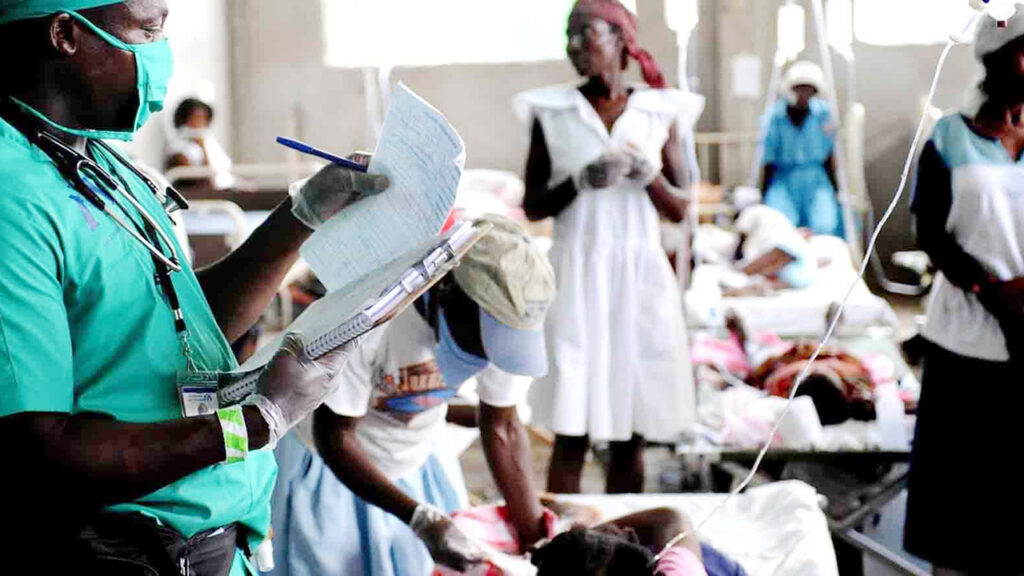 Professionals across the country have cautioned the Federal Government against adopting some population policies being sponsored in Nigeria by the West.
Professionals across the country have cautioned the Federal Government against adopting some population policies being sponsored in Nigeria by the West.
The experts say the depopulation of Nigeria has been the major concern of the United States and European nations that are scared of becoming ‘minority whites’ by 2045, making reference to World Census projections. They are of the opinion that the Industrial Revolution, which began in Britain from 1780 to 1880, was fueled by an upsurge in population growth. They, therefore, urge the Nigerian government to make the best use of the nation’s population even as they argue that populace control with contraceptives is a threat to women’s health. CHIJIOKE IREMEKA writes.
A recent call by President Muhammadu Buhari administration for population control through contraceptives is eliciting criticisms from experts who have described the recommended approach as dangerous to the health of women.
Among the critics is the Chairman, Chidicon Medical Center, Owerri, Imo State, Prof. Philip Njemanze, who is also a member of the International Academy of Astronautics, the UNESCO body for space research.
According to Njemanze, contraceptives are harmful to women’s health because the estrogen derivatives are the main active ingredients and causes of cancer as well as blood clots, which lead to heart attacks, strokes and deep venous thrombosis.
The UNESCO space researcher made the comment while reacting to the latest launch of the Revised National Policy on Population for Sustainable Development two weeks ago by President Buhari, during which he called for urgent measures to address Nigeria’s high fertility rate through expanding access to modern contraceptive methods.
The President also inaugurated the National Council on Population Management (NCPM), chaired by him with Vice President Yemi Osinbajo as Deputy Chairman and heads of relevant Ministries, Departments and Agencies (MDAs) as members.
Buhari had said that the overall goal of the Revised National Policy on Population was to improve the quality of life and standards of living of all Nigerians. The policy is geared towards expanding family planning services, counselling and commodities, as well as promoting a modern way of birth spacing.
“This will enable Nigeria to achieve rapid fertility control, improve the health of women, adolescents, newborns and children among other population groups,” the President said through his Special Adviser on Media and Publicity, Mr. Femi Adesina.
Buhari also said the nation’s populace, the largest in Africa and seventh globally, are among the few whose fertility is still growing. According to him, fertility is hinged on a youthful composition, with over 72 per cent of them being below 30 years, while half of the female inhabitants are in their reproductive years – between15 and 49.
He rationalised the importance of investing in the quality education of young people, particularly girls, human capital development and advancing holistic efforts to achieve the significant demographic transition.
The President added that the implementation of the policy would require credible, reliable, timely, robust, geo-referenced and well-disaggregated data, expressing confidence that the information that would be generated from the forthcoming census would be helpful in achieving the goal of the project.
But reacting to the Federal Government’s position on the use of contraceptives for planned population control strategy, Prof. Njemanze, who is also the Chairman, Global Prolife Alliance, said the policy would lead to the killing of unborn Nigerians, while the mothers will die agonisingly.
This, he insisted, would result in rising maternal mortality rate in Nigeria which is 814 per 100, 000 live births.
“This rate could quadruple with mass use of contraceptives in Nigeria. The global Maternal Mortality Rate (MMR) is 152 deaths per 100, 000 live births, much lower than in Nigeria. The population policy is the greatest threat to the health of Nigerian women.
“This could be prevented by implementing Natural Family Planning (NFP) – the ability to track ovulation to prevent pregnancy – which is more effective and has no debilitating health effects. On the overall population control policy, this strategy is not evidence-based,” the expert said.
Njemanze also maintained that reduction in population is counterproductive to economic development, as the population is the main engine driving economic growth worldwide.
“The most important index is population density. Nigeria in 2020 was at 240 persons per square Km. This is considered below the threshold for real economic development. In contrast, Singapore is at 8, 000 persons per square Km, and Hong Kong at 6, 690 persons per square km.
“In Lagos, we have a population density of 6, 871 persons per square km which account for 26.7per cent of Nigeria’s total Gross Domestic Product (GDP) and over 50 per cent of non-oil GDP. So, if we could replicate Lagos in the other six geopolitical zones by population density, we could transform into a G20 economy in less than 10 years.
“We can only get there through population growth, not depopulation. The attempt by detractors of Nigeria to stem the tide of population growth has become urgent because Nigeria is approaching the critical 300 people per square kilometer threshold for economic transformation.
“We must ignore this push and actively promote population growth through social justice system of equity of opportunity. We must invest in people through health and education. We must fight corruption that robs us of our development and future.
“The international genocidal policy of population control is hypocritical. The West opens its borders for brain drain from Africa and elsewhere. All their borders are open for workforce immigration. If the population was bad, why then is the ‘Open Border’ policy in Europe and the United States?
“Nigerian Council on Population should focus on measures for use of positive population growth rather than depopulation. Natural Family Planning (NFP) should be adopted in schools and public establishments.
“NFP makes sense for the health of women and a rational policy for national development,” the UNESCO researcher said.
Sadly, since 2014, the global demographic institutions have continued to decorate a soot picture for Nigeria as its population continues to grow without restraint while the economy retrogresses.
“But in instead of harping on mechanised agriculture, infrastructures and industrialisation to improve food and industrial production, they (the West) continued painting grime pictures of the country’s future and preaching depopulation of Nigeria, the biggest home for the Black race,” Njemanze lamented.
With an estimated population of over 206.1 million people, according to the World Bank and the United Nations, Nigeria experienced annual population growth of about 2.7 per cent between 2010 and 2015.
A fear ignited by the UN’s report is that Nigeria would soon overtake the United States (US) to become the third-most populous country in the world by 2050 if Nigeria’s growth rate continues progressively. According to the World Population Prospects 2017, this growth rate is driven by high fertility rates, high infant mortality rates and the cultural value of large families. Thus, Nigeria has grown to become the seventh-most populous country in the world, and its population is projected to surpass 300 million people by 2050.
The Guardian learnt that at the country’s Independence in 1960, Nigeria had a population of 50 million people. Today, the figure stagers around 206 million people, according to the Chairman, National Population Commission (NPC), Nasir Isa Kwarra.
Like in the 50s and 60s, issues bothering on family planning and birth control are fast resurfacing in Nigeria’s local and foreign policies, following the perceived fear and the western world’s projections that Nigeria’s population would soon outgrow its means of sustenance.
Frightened by these projections and soothsaying, former President Goodluck Jonathan, during his regime, called for birth control and family planning as a way of tackling health and other socio-economic woes plaguing the country.
But the call was faced with stiff opposition on the ground that the new policy was being sponsored by the West to further reduce the population of the developing countries that pose a threat to them (the West). Hence, the policy was unpopular to the populace, whether lettered or unlettered.
The Guardian learnt that the fear of the Nigerian population and the possibility of it outgrowing the means of its sustenance is a derived trepidation, implying that the West is not scared that Nigerians will starve to death, but they are afraid that Nigeria (the home for the biggest black race) has become a threat to some of the western countries whose fertility rate has dropped and is facing extinction.
“Nowadays, it’s hard to see a pure white skin without a black skin being by his side. The ratio of white to black is unofficially 2:10. The black is gradually taking over with a high fertility rate. This is what the white is scared of and not that they love us so much,” a lawyer, Emeka Ndukwe, said.
The Principal Partner, Lawrence Ndukwe and Co., said natural family planning would be ideal. “It is not necessary to tamper with Nigerians fertility, whether woman or man; it’s their rights. Any attempt by the government to reduce Nigeria population, overtly or covertly, through ‘free contraceptives campaigns’, whether injectables or oral administration or implantation, which will distort the citizens right to fertility and procreation, is in breach of Section 33 Right to life.”
In his work, Diversity Explosion: How New Racial Demographics are Remaking America, William H. Frey, on Wednesday March 14, 2018 said the US will become ‘minority white’ in 2045.
According to him, the new population projections confirm the importance of racial minorities as the primary demographic engine of the nation’s future growth, countering an ageing, slow-growing and soon to be declining white population. The projected growth rate for blacks is 34 per cent.
The new statistics project that the US will become “minority white” in 2045 as, during that year, whites will comprise 49.7 per cent of the population in contrast to 24.6 per cent for Hispanics, 13.1 per cent for blacks, 7.9 per cent for Asians, and 3.8 per cent for multiracial populations.
Frey said: “The shift is the result of two trends. First, between 2018 and 2060, gains will continue in the combined racial minority populations, growing by 74 per cent. Second, during this time frame, the ageing white population will see a modest immediate gain through 2024, and then experience a long-term decline through 2060, a consequence of more deaths than births.
“Among the minority populations, the greatest growth is projected for multiracial populations, Asians and Hispanics with 2018–2060 growth rates of 176, 93, and 86 percent.
“The demographic source of growth varies across groups. For example, immigration contributes to one-third of Hispanic growth over this time span, with the rest attributable to natural increases (the excess of births over deaths). Among Asians, immigration contributes to three-quarters of the projected growth.
“These new projections differ from those that the census previously released in 2014. Those projected a minority white tipping point in the year 2044 due to larger projected immigration and somewhat greater growth for several minority groups. The national growth was also somewhat larger in the 2014 projections. The U.S. was predicted to reach a population of 400 million in 2051.
Meanwhile, the London Economist of October 31, and November 6, 2011, alarmed that the world fertility rate would fall below the global replacement rate of 2.1 between 2020 and 2050.
The planned depopulation of Nigeria will, therefore, be sabotage of national development and a threat to national security, experts said.
“With 110 people per square Km, Nigeria is grossly under-populated compared to Europe 350-550 people per sq. Km; America 300-550 per sq. Km and Asia 300-5500 per sq. km.,” a statistician, Chikwue Caroline, said.
She urged the government to concentrate on providing basic amenities and building infrastructures like electricity and good roads to attract investors.
Chikwue noted that there is no sensible investor that would risk his or her investments where there is policy inconsistency and somersault and where destruction of lives and properties has become rampant.
“Or has the killings become part of the physical population control in Nigeria going by the number of lives being wasted every day in the country under the watch of the government?” she asked.
In the 2008 National Demographic and Health Survey (NDHS), the contraceptive prevalence rate (CPR) for Nigeria was 15 per cent for any method and 10 per cent for modern methods, which include female and male sterilisation, pills, intrauterine devices (IUDs), injectables, implants such as Norplant, female and male condoms, lactational amenorrhea method (LAM), emergency contraception, diaphragms, and foam, jelly or spermicide.
On the supply side, the survey revealed that the challenges of birth control in the country include inadequate access to family planning services and poor quality of services. In the past, inadequate demand creation efforts by the government contributed to the low uptake of family planning.
According to the 2006 Population and Housing Census, Nigeria has one of the fastest population growth rates in the world, 3.2 per cent. It would take 22 years for the nation’s population to double. The population increased from 88.5 million in 1991 to 140 million in 2006.
Recently, the International Monetary Fund (IMF), in its released World Economic Outlook for 2016, listed 16 of the fast-growing economies in Africa, but Nigeria was nowhere to be found. Nigeria was listed as the 3rd world fastest growing economy in 2014. British Government also listed Nigeria as the 4th fastest growing economy in 2011, but suddenly in 2015, the country recorded zero economic growth while the population continues to grow.
However, experts argue that population growth is not the country’s problem but the government’s refusal to be responsible and alive to its obligations to make the best use of the increasing population, which is the strength of any serious country.
No Population Pressure, No Sustainable Development
Economists affirm that rapid population density is not an obstacle to economic development, what may be an obstacle is the rate of growth, not the growth itself. They described the high population as the key indicator of industrial growth.
Years ago, the Executive Director, African Centre For Leadership, Strategy & Development, Dr. Otive Igbuzor said the problem with Nigeria was not overpopulation. “The population should be an asset to place Nigeria among the 20 economies of the world by 2025 and not the other way round.”
According to him, the country needs to build its human capital to drive development rather than depopulation.
An economist, Albert Ngwana said the phenomenal growth of the world population had been accompanied by great economic wealth and development, noting that as the population increases, economic activities increase.
To him, an increase in population pressure and density provides the impetus for industrialisation, hence “No population pressure, no sustainable development.”
He further argued that the Industrial Revolution in Britain from 1780 to 1880 was fueled by an upsurge in population growth. Out of the five components necessary for rapid economic development– dense population, human capital, natural resources, capital and technology– the population is the most important.
“Without population, other factors cannot accelerate rapid economic development,” he insisted.
The Guardian gathered that the 27 richest countries of the world – Luxembourg, Liechtenstein, Switzerland, Bermuda, Norway, Denmark, Japan, United States, United Kingdom, San Marino, Iceland, Cayman Islands, Sweden, Germany, Austria, Monaco, Netherlands; Finland, Belgium, Hong Kong, Brunei, France, Singapore, Ireland, Australia, Italy and Canada – all have high population density and income per capita, whereas the poorest countries in the world have low population density and a low income per capita.
Japan, for instance, has about a density of 335 persons per sq. km. and income per capita of US 34, 313: Hong Kong and Singapore also have high population density and high per income capita. Chinese economy has been growing steadily in the last 15 years, and the fastest growing economy in the world.
Food Production For Rising Population
Looking at increasing industrial and food production as a way forward, Director General of National Biotechnology Development Agency (NBDA), Prof. Lucy Ogbaudu, said to sustain the growing population, and for Nigeria to escape imminent food shortage and its adverse effect of famine, the biotechnology solution has to be accepted in the agriculture sector.
Ogbuagu expressed the views in Abuja during an agricultural biotechnology and biosafety workshop for the Professional Bodies Cadre, organised by NABDA in collaboration with the Open Forum on Agricultural Biotechnology (OFAB), the Programme for Biosafety System (PBS) and the National Biosafety Management Agency (NBMA).
He also argued that Genetically Modified Organism (GMO) foods have been approved for consumption without any negative effects attached to them by the World Health Organisation (WHO) and Food and Agriculture Organisation (FAO).
Dr. Rose Gidado, who is the Country Coordinator of Open Forum on Agricultural Biotechnology (OFAB) in Africa, said the scientists needed to understand and appreciate the solution for food insecurity that is embedded in biotechnology, saying that biotechnology is science and evidence-based.
On the contrary, Prof. Njemanze urged Nigeria to be careful of what is being proposed by USAID to governors of the northern states, alleging that USAID is illegally distributing GMO seeds to Internally Displaced Persons (IDPs) to plant so that Bill Gates and his company (majority shareholder) Monsanto Partners will capture the food security of the Northeast.
He argued that the GMOs do not replicate so that after the first planting season, they will capture the seed chain supply first as aid and then they own the entire food security of Nigerians.
Quoting the words of Kissinger Maxim, “Control the food and you control the people,” Njemanze said ignorance and naivety of some leaders should not be allowed to throw the nation or any part of it into a terrible situation.
Professor of Political Economy and a director at Lagos Business School, Pat Utomi said a population growth that is not properly managed would, in most cases, give rise to two worldwide concerns, mass unemployment and mass migration to cities.
He observed that such usually happens in a ‘dual economy’ such as Nigeria where about 30 per cent of the population is confined to urban areas, while the remaining 70 per cent are either in rural areas or small towns.
He noted that the dual economy unless cautiously countered, produces mutual poisoning in which industrial development in cities is destroying the economic structure in rural areas.
An anti-contraceptive campaigner under the umbrella of Project for Human Development (PHD), Sonnie Ekwowusi, who is also a member of a coalition of NGOs against depopulation of Nigeria, said history had shown that there is no country in the world that has ever reaped enormous consequences from population reduction.
“Decades of demographic forecast have had their adverse effects in many European countries that they are now enacting policies that encourage childbearing,” he said.













